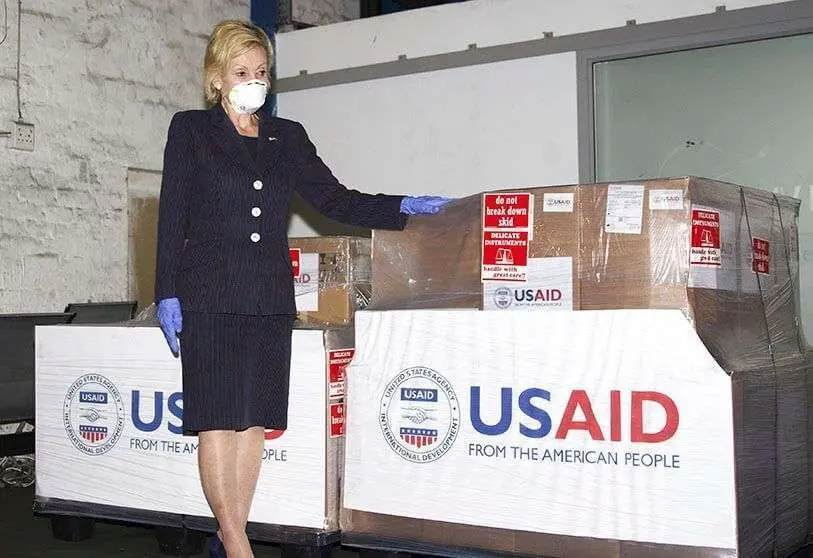Iran plots to assassinate US ambassador to South Africa

Tension between the United States and Iran is not over and has returned to the centre of the international chessboard. New intelligence reports reveal that the Iranian theocracy is planning the assassination of the American ambassador to South Africa, Lana Marks, according to the website POLITICO, which has accessed the reports exclusively on Sunday. The aim of the ayatollahs is to avenge the death of Qassem Soleimani, leader of Iran's Revolutionary Guard. Soleimani was killed by the American army in Baghdad in January this year.
The United States has been aware of this threat since spring, although American intelligence warns that it has intensified in recent weeks. The Iranian embassy in Pretoria is involved in the plot, according to a US government official. Neither the White House Security Council, nor those responsible for Iran at the United Nations, nor the officials of the South African embassy in Washington have commented on this issue. Spokespersons for the State Department, the CIA and the Office of the Director of National Intelligence have directly refused to comment.
Marks has already been informed of the threat posed to her, according to US defence officials. Marks, 66, was sworn in as the US ambassador last October and she is close to President Donald Trump. Supporters retort that she is a successful businesswoman and owns a brand name. A personal friend of the late Princess Diana, she also was born in South Africa and speaks some of the country’s key languages, including Afrikaans and Xhosa. The intelligence community isn’t exactly sure why Iranians would target Marks, who has few, if any, known links to Iran. It’s possible the Iranians took her long friendship with Trump into consideration, the U.S. government official said.
The Iranian government also operates clandestine networks in South Africa, the officials noted, and has had a foothold there for decades. In 2015, Al Jazeera and The Guardian reported on leaked intelligence documents that detailed an extensive secret network of Iranian operatives in South Africa. Marks may also be an easier target than U.S. diplomats in other parts of the world, such as Western Europe, where the U.S. has stronger relationships with local law enforcement and intelligence services.
Iran and South Africa have been allies in recent decades, even in the United Nations, where South Africa has sometimes advocated Iran. It is believed that South Africa's uranium deposits have been of great interest to Iran, as it was intensifying its nuclear programme, which Teheran has always insisted was intended for peaceful energy purposes. The two have a military relationship and have signed some defence pacts.

Days after Soleimani's assassination, Iran responded by launching ballistic missiles at a military base housing US forces, injuring several US soldiers. Trump refused to retaliate at the time and announced that Iran was in retreat and was not a danger to the United States. Some analysts, however, said at the time that Iran likely would seek other ways to avenge Soleimani’s death. Gen. Kenneth McKenzie, the head of U.S. Central Command, was at the top of Iran’s hit list earlier this year, according to media reports. McKenzie said last month that he expected a new “response” from Iran to America’s ongoing presence in Iraq. “I do not know what the nature of that response will be, but we will certainly be ready for it, should it occur,” he said. On Wednesday, McKenzie confirmed plans to cut the U.S. troop presence in Iraq from 5,200 to 3,000 by the end of September.
During an online forum in August, McKenzie said Iran was “our central problem” in the region, and acknowledged that the danger from Iranian proxies in Iraq had complicated U.S. efforts against ISIS, the radical Sunni terrorist organization and movement. “The threat against our forces from Shia militant groups has caused us to put resources that we would otherwise use against ISIS to provide for our own defense and that has lowered our ability to work effectively against them,” he said.
Relations between the United States and Iran have been strained since the 1970s, but after Donald Trump's arrival at the White House, tension has escalated and the two countries have been on the brink of military conflict on more than one occasion. Last summer, the U.S. blamed Iran and its proxies for a series of explosions aimed at oil tankers. Iran took down a U.S. drone, and the U.S. later managed to take down an Iranian drone.
The countries’ dispute deepened in the months afterward, especially in Iraq, where America and the U.S. have long engaged in proxy warfare. In December, an American contractor was killed in Iraq after an attack by an Iranian-allied militia. The U.S. reacted by bombing sites held by the group, killing around two dozen of its fighters. Soon afterward, protesters believed linked to the militia breached parts of the U.S. Embassy compound in Baghdad.
Then, in early January, the United States staged an airstrike that killed Soleimani as he was visiting Baghdad. It was a major escalation given Soleimani’s importance in Iran, although U.S. officials described it as a defensive measure. Soleimani led the Quds Force, a unit of Iran’s Islamic Revolutionary Guard Corps that oversees much of the country’s military activities outside its borders. Americans blame him for the death of numerous U.S. troops in the region.








